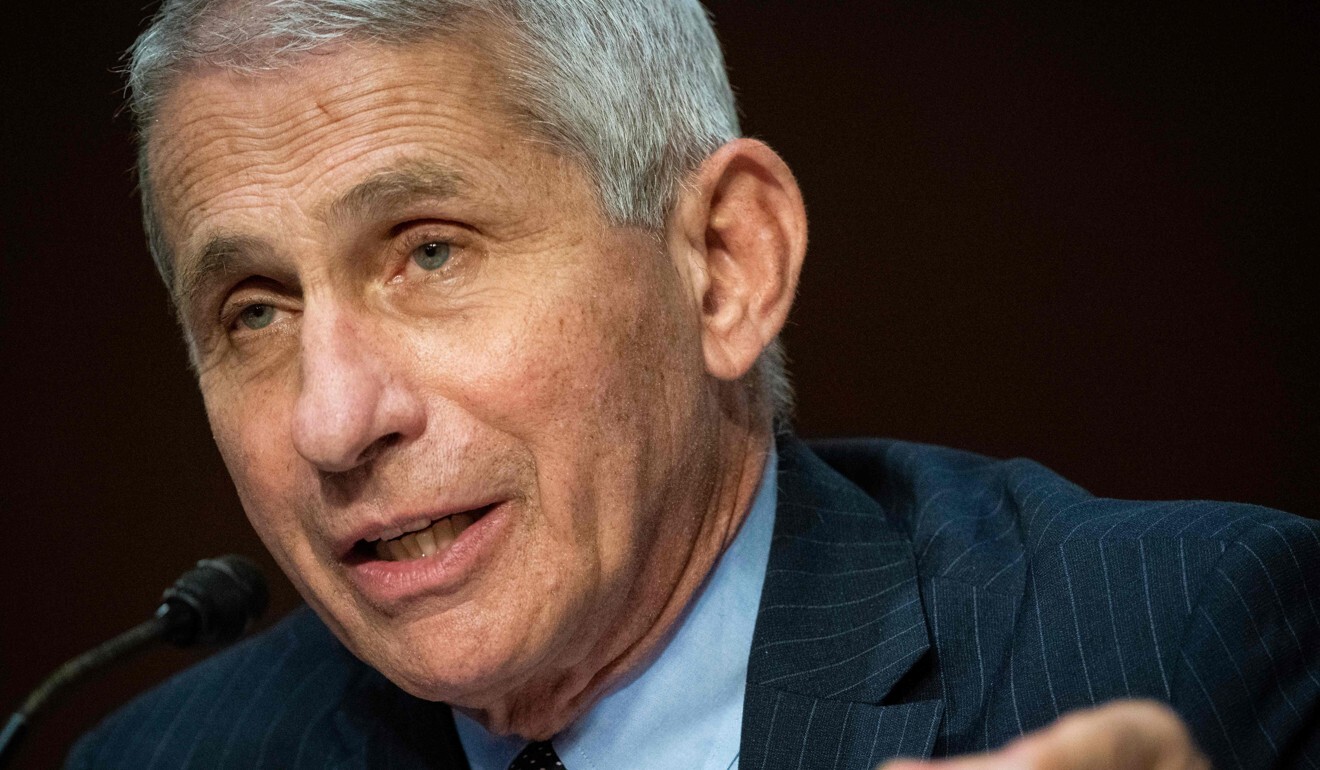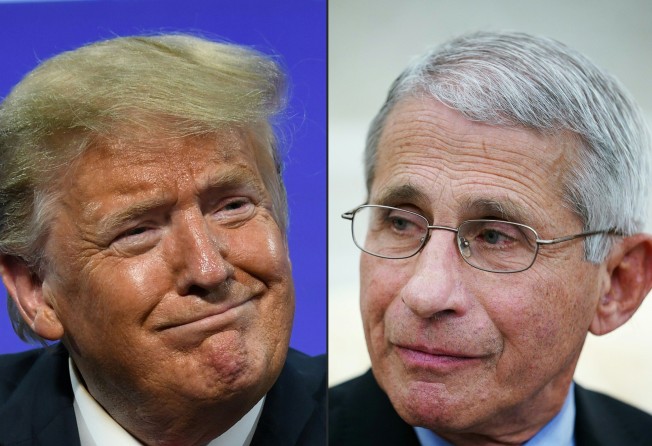
Trump downplays rift with coronavirus expert Fauci, saying they have a ‘good relationship’
- The US president said he gets along with infectious disease expert Anthony Fauci, as evidence mounts of growing friction between them
- Fauci said he had not briefed Trump on Covid-19 in over two months, and had not seen him in person at the White House since early June

US President Donald Trump on Monday said he had a “good relationship” with Anthony Fauci, the nation’s top infectious disease expert, despite evidence of a growing rift between the two men as coronavirus cases surge in several states.
“I get along with him very well,” Trump told reporters during an event at the White House. “I like him, personally.”
The conciliatory tone was a notable shift after White House officials over the weekend circulated to reporters a dossier of guidance Fauci had made early in the pandemic that was subsequently reversed.

That effort came after Trump publicly criticised Fauci in a pair of television interviews, and an interview published last weekend by the Financial Times in which Fauci said he had not briefed the president in more than two months, and had not seen him in person at the White House since early June.
Evidence of continued friction was still apparent on Monday, with Trump noting he disagreed with Fauci over the decision to cut off certain travel from China – a decision the president said saved tens of thousands of lives. And White House press secretary Kayleigh McEnany described Fauci as one of many public health officials – who she said offered “varying opinions sometimes” – providing guidance to the president.
But McEnany denied the White House was working to discredit Fauci, and described the catalogue of perceived missteps by the director of the National Institute of Allergy and Infectious Diseases as a routine answer to questions posed by reporters for The Washington Post.
“We provided a direct response to a direct question, and that’s about it,” McEnany said.
She added that Trump “certainly” still appreciated Fauci’s advice, despite the president saying in an interview on Thursday with Fox News he had “made a lot of mistakes”.
The president said Fauci had opposed his decision to ban travel from China toward the beginning of the pandemic, a move the White House argues saved hundreds of thousands of lives.
Two days earlier, Trump said he disagreed with Fauci’s assessment that the country was still “knee-deep” in the first wave of the pandemic.
“I disagree with him,” Trump told Gray Television. “Dr Fauci said don’t wear masks and now he says wear them.”
Fauci has defended the advice that Americans forgo wearing masks early in the pandemic by saying the administration wanted to preserve supplies for health care workers on the front lines. And health officials long warned their advice for avoiding the spread of the disease would change as they gathered more information, he said.
“We were concerned. The public health community, and many people were saying this, were concerned that it was at a time when personal protective equipment, including the N95 masks and the surgical masks, were in very short supply,” Fauci told TheStreet.
Fauci, known for his data-driven approach to managing the crisis, was from the start of the pandemic on a collision course with Trump, whose focus on blaming China for the pandemic and reopening the US economy as quickly as possible overshadowed – and many times contradicted – messages from the nation’s top public health officials.
That separation has corresponded with a number of misstatements by the president, including his July 4 claim that 99 per cent of coronavirus cases were “harmless”. Fauci said he was “trying to figure out where the president got that number” but still insisted he was “sure” his messages were being received by the president.
Fauci has also openly clashed with some White House officials, including top trade adviser Peter Navarro, who has fanned the administration’s promotion of the antimalarial drug hydroxychloroquine to combat coronavirus.
Fauci and other government scientists warned that anecdotal reports about hydroxychloroquine were not supported by the data, and warned that taking the drug could result in serious side effects. The Food and Drug Administration cautioned against using the drug and discontinued a study of its effectiveness, citing health risks.
But Trump has openly championed it – even opting to take hydroxychloroquine when a White House staffer contracted the disease.
“The idea that this is a dangerous drug – it’s just silly,” Navarro, an economist with no known medical training, told reporters Tuesday at the White House.
The president, always attuned to public opinion polls, has openly marvelled at the high approval rating his health team has earned, even as judgment of his performance has soured. Just one-third of Americans approved of his handling of coronavirus, while two-thirds disapproved, according to an ABC News/Ipsos poll released on Friday.
The same survey showed that 59 per cent of Americans believed that the US was reopening the economy too quickly – a push that Trump has led and Fauci has resisted.
One administration official with knowledge of the relationship downplayed the friction, saying Fauci had not internally expressed alarm over the situation. The divergence boiled down to a president who was optimistic about the country’s ability to emerge from the pandemic interacting with a health official fundamentally conservative in his approach, the person said.
Others within the president’s orbit chalk up the disagreement to understandable frustration on Trump’s part.
“I don’t think we should necessarily focus on that personal reaction between the president and Dr Fauci because again, these are real relationships, ordinary relationships and if you’ve been wrong a couple of times, it makes somebody wonder whether you’re wrong again,” former chief of staff Mick Mulvaney said in an interview with CNBC on Monday.